A bumper week (again) – here is your easy way to catch up on everything all in one place
Student support
Emma Hardy, the Shadow Universities Minister, has written to Michelle Donelan (Government’s Universities Minister) to highlight students facing significant hardship.
- In our last meeting we discussed the fact that many university students needed urgent financial help to cope with the extraordinary circumstances they find themselves in. You assured me you were confident that every university would be in a position to help every student in genuine need through its hardship funds. However, after speaking to universities and the NUS I do not share your confidence.
She goes on to describe universities so overwhelmed by the demand for hardship funds they have begun crowdfunding and another university with tricky fund rules which Hardy says prevents those most at need from applying. She also explains that students without children are ineligible for Universal Credit, and few have been furloughed due to the nature of their part time work contracts.
- I do not have to emphasise the fact that it will mostly be those students who have overcome the greatest barriers to get to university who will be affected the most. I have already heard concerns from those in the sector that the drop-out rate will be higher this year and the news I am hearing, about the failures of hardship funds to support all those who need help, adds to my worry… It cannot be right for their welfare to be considered the sole province of individual universities, which under current circumstances means consigning it to the luck of the draw—a lottery which has left some unable to manage…I would urge the Government to take a pro-active role and I would welcome any proposals for guaranteeing there is adequate financial provision for the young people who have been caught in this storm.
Research Professional say:
- This is not a shouty letter venting outrage but one that begins by thanking the minister for listening to different points of view, before shining a light on an area of government failing.
- There has been no mention so far of universities in the UK government’s strategy for national recovery after lockdown. This is something of an oversight and one that the opposition parties might want to start asking questions about as we all begin to emerge from our houses blinking into the early summer sunlight.
They also highlight that the Shadow letter doesn’t set out suggestions for how the Government should support students. Their daily email runs through some possibilities and effectively discounts them.
Student Petition: And if you’ve been wondering what happened to the student petition to have tuition fees reimbursed due to this year’s strike and the loss of face to face teaching due to C-19 the official word is – The Committee decided to take further oral evidence on this petition, from the relevant Government minister.
Parliamentary questions
Financial Stability
The Government listened to the measures UUK requested on behalf of the HE sector and issued their support package cherry picking the elements that fitted with the Government’s aims and doing little other than moving payments forward with the rest. Research Professional have an interesting article rethinking it all from Pam Tatlow (ex-MillionPlus Chief Executive).
- The deal that universities need to support them through the coronavirus crisis is not the one that they asked for. Nor is it the one that was begrudgingly put on the table by the Westminster government, which is little more than a lend-lease agreement with strings.
The article critiques the UUK approach in compiling and launching their request to Government.
- UUK’s first requests focused on research…Its proposals would undoubtedly have benefited the small group of universities that receive the lion’s share of taxpayer-funded research monies. In the event, only a very modest amount of quality-related funding (£100 million) has been brought forward.
- Universities that have used international fees to subsidise their reputations as world leaders in research will undoubtedly claim that without additional funding they will no longer be financially viable. This may well be so, but if such a bailout is forthcoming there should be conditions attached. For example, these institutions could be required to demonstrate that they are financially viable within five years based on their UK activities.
- UUK’s own estimates suggest that there may be up to 15 per cent fewer home and European Union students progressing to university in 2020. It is therefore difficult to understand its proposal that universities in England and Wales should be able to recruit up to 5 per cent more students than the numbers they forecast
- Nor do the elaborate rules and stern warnings from the Office for Students about unconditional offers and admissions practices add up. All a university higher up the hierarchical food chain has to do is issue many more offers at lower grades in the first place, leaving the majority to keep afloat by reducing courses, student opportunities and staff.
Pam concludes:
- The right deal for universities has to mean a return to collaboration and an end to the market that has bedevilled higher education for a decade. It has to mean a return to the idea (which students have never abandoned) that studying a subject that you love for its own sake is as good a rationale for higher education as the money that you will earn (or probably not earn to the same extent in a long recession).
- It has got to mean more and not less funding for social justice, giving the students who study at the most socially inclusive institutions the same resources as those whose institutions are well endowed through decades of public funding, private endowments and capital investment.
- And of course it must mean a return to the direct funding of universities, the restoration of maintenance grants and an end to the tuition fees that have restricted the ambitions of those who would have liked to study at university when they were older, or to return to study, including as postgraduates and part-time.
- Universities, with all their talents and ideas, should be on the front line and on the front foot in arguing that the crisis should not be paid for through extra taxes and pay freezes but that the government should borrow to invest, especially in higher education as a right for all.
Parliamentary questions
Education Select Committee
The House of Commons Education Select Committee met virtually to explore the effect of the coronavirus on children and young people’s services (including HE). You can read a summary of the sessions compiled by Dods here, one by Research Professional here, Wonkhe’s version is here, or watch the full Committee sessions here. In brief it covered:
Session 1
- 2020/21 recruitment ramifications will not be known until September.
- The Government’s support package isn’t enough to support the HR sector. Criticism included that it simply brought forward payments rather than provided additional funds and that the student number cap benefitted the wealthier universities at the expense of locally based universities.
- Students have lost their supplementary incomes and are struggling financially. Wellbeing, mental health and the option to redo the year without cost were mentioned. Concerns over PhD students were raised.
- The increased workload on HE staff was a concern.
- The student rent situation was discussed and calls were made for the Scottish move to release students from their private rental agreements to be adopted in England.
- Quality of online tuition was discussed covering that it wasn’t what students had expected from their degree programme and online access and assessment issues. (The Financial Times has a nice counterpoint to this emphasising the positive benefits since the move online, and why is should continue to some degree.)
- There was discussion on fees being revisited during the pandemic.
- The importance of how UCAS ‘control clearing’ was mentioned.
- UCU stated Government should indicate when universities should reopen their campuses rather than it being an individual decision taken by the university itself. Research Professional give this aspect a lot of coverage in their description of the Committee’s session. iNews specifically covered this aspect of the session, as did the Telegraph.
Session 2
- Session 2 focussed on disadvantaged students. The OfS reiterated the importance of the access and participation targets, including discussion on degree apprenticeships. The access gap and unconscious bias faced by black and disadvantaged communities were mentioned. The OfS stated they believe the next 5 years will show the biggest step forward in social mobility and social justice for 2 generations.
- On a return to ‘normal’ campus based learning in autumn 2020 OfS stated that they required universities to be as clear as possible in explaining students what to expect if they accepted an offer. They did not want any promises of a return to university life when it might not be possible. The Times and BBC covered this.
- OfS stated there were not any HE institutions at immediate risk of collapse but they do expect the financial sustainability of the sector to be affected by the pandemic and C-19 poses serious risks to the sector. They also stated that international students were not being chased simply as cash cows. Research Professional disagree and name SOAS as teetering on the financial edge.
- OfS stated they have disseminated good practice examples in student mental health and accommodation and that sharing good practice examples is a powerful way to influence the agenda.
- OfS dodged an answer to whether student paying full tuition fees was justifiable if they were only receiving partial online learning stating it was a ‘live’ question and that it depended on the quality of the university provision. However, at present students should pay full fees and if the provision is inadequate take this up with the Office of the Independent Adjudicator.
- Chair, Robert Halfon, followed up on how OfS judged quality to which they responded they measure through output indicators and student complaints. (Wonkhe give this a mention here.)
Research Professional cover the House of Commons Science and Technology Committee who have
- issued a 19-page letter to prime minister Boris Johnson, setting out “10 key lessons the UK government should learn from its experience of handling the first months of the pandemic”. The Chair of the Science and Technology Committee is the ex-Secretary of State for BEIS, Greg Clark.
Virtual Parliament
Prospect Union, who represent staff working in the Houses of Parliament, will be resisting government plans to cancel the virtual parliament and bring MPs back to Westminster as early as next month over fears about safety and the practicality of social distancing. Prospect says it will work with government on restoring any essential functions but that the key elements of the system must be retained for now. Politics Home have an article on the return to parliament schism.
However, a survey by The House says only 23% of MPs believe the virtual ability to ask questions and take part in debates remotely via video link should be retained. Only 11% believed the right to vote remotely under any circumstances should be retained. Although 55% agreed that remote or proxy voting for MPs unable to attend due to ill health should be retained and there was some support for parental leave remote measures. MPs representing remote areas of the country (such as the Outer Hebrides) have called for online voting to continue and emphasised it would stop a huge amount of unnecessary journeys by MPs and 35% agreed MPs on overseas trips should be allowed to vote remotely. Yet only 19% of MPs agreed that MPs with constituencies over 4 hours travel away should be allowed to vote remotely. Some MPs are opposed to the remote working because it would restrict access to
- get hold of government ministers in person. The fact that we can nab the chancellor of the Exchequer in the division lobby is worth an awful lot. I think that would be a huge mistake.
Another says
- Though the temporary measures are working “reasonably well”, he fears that MPs could risk losing out “on reading the mood of the room and picking up water cooler chat” if they continue to work remotely in the future. He adds: “I am sceptical about this becoming the default. I don’t ever want to be the moaning voice on the screen and the wall that you can basically mute and ignore.”
Others point to gender equality and greater diversity measures that can be achieved through the technologies.
Conference Recess
The Labour Party has cancelled their annual September conference due to C-19. It remains to be seen if the other parties will follow suit and Parliament will continue to sit rather than take recess.
Autumn opening
The Financial Times talks of a blend of online and in-person education post pandemic, not just as a temporary measure but as a more accessible and comprehensive overall offer. It states it
- could revolutionise universities, help them survive the economic crisis and bring higher education to tens of millions of people who have never set foot on campus…Many “left-behind” adults everywhere would love to learn from home, get qualifications and change their lives, especially if the pandemic has left them jobless…We need more adult learners. Their numbers in the UK almost halved between 2004 and 2016…As lifespans expand, and technology changes, we should top up our education over the decades, while keeping our jobs and families. University is wasted on the young…Blended teaching could help more students enter higher education, argues Chris Stone of Oxford University’s Blavatnik School of Government. He proposes a model in which some students spend a month on campus, then months studying from home, before returning to campus for the final weeks. That would allow universities to teach multiple cohorts a year, cutting tuition costs…Anita Pilgrim, who teaches at the UK’s Open University, which pioneered blended learning, cautions that remote learners need lots of support. Her university has educational advisers who help students find a study-life balance, apply for funding, access resources for dyslexia etc…Teaching online has shortcomings — but so does in-person teaching.
OfS, UUK, Advance HE and the QAA are all rumoured to be putting together guidance for the HE sector on autumn 2020 possible commencement. Whilst answering questions at the Covid-19 press conference Grant Shapps, Transport Secretary, stated that: The education secretary will be returning to the subject and providing guidance. Meanwhile more and more sector sources are acknowledging that the teaching model is likely to be a blended approach from the autumn.
Wonkhe have a blog ostensibly about student spirit with a nice slant looking at how online interaction and socialisation worked well during lockdown for a sporting tournament. Rather than the deficit approach of what has been lost during lockdown it illustrates new self-organised approaches which were different and positive.
On Tuesday evening Cambridge University stated it intended to conduct all teaching online possibly with some smaller in-person taught groups if social distancing could be achieved. Of course, they intend to adjust their model in-year should restrictions be relaxed or further curtail contact. The University of Bolton takes a completely different approach – they intend to open for in-contact teaching: be able to study and engage in person regularly with other students and staff. With students allocated 12 hours on campus per week. Of course, the remaining time will be topped up by online and self-study.
Wonkhe cover both stories and provide media links:
- Cambridge may be one of only a few universities that could still expect a full, or near-full cohort to start in the autumn with the year ahead expected to be online – as other providers that have struggled to recruit in the past may yet find it challenging to convince students to turn up to a fully online academic year. The position is complicated further by the fact that the college system may not be an easy point of comparison for others that rely more on large lectures.
- The news was originallybroken by Varsity, was picked up last night by the BBC, and is covered this morning by the Times, the Mail, the Telegraph, the Express, the Evening Standard, the Guardian, the Independent, the Tab, the FT and is on the Press Association It’s also on several international news sites including Forbes.
- Meanwhile, the University of Bolton has moveddecisively in the other direction, announcing a number of technical measures – from temperature sensors, to queueless catering, to bike loans – to support a return to campus in the autumn. Manchester Evening News has the story, and the university has released an animated video.
Here is the full list of Bolton’s intended changes to enable on campus teaching:
- Providing regular socially distanced face-to-face tutorials, laboratory experience, access to arts studios and specialist facilities, etc
- Implementing an effective scheduling system, limiting significantly the number of students on campus at any one time to keep you secure
- Dividing sessions for access on campus into set times per day, for example, possibly between 8am-2pm and 2pm-8pm
- Strictly observing recommended social distancing guidelines at all times
- Installing sophisticated airport style walk through temperature scanners at every building entry
- Making bicycles available for loan by students, enabling them to avoid crowded public transport
- Providing on-campus bike parks as well as car parks
- Ensuring there are adequate additional sanitiser stations
- Providing and making the wearing of face coverings on campus compulsory for the foreseeable future to safeguard the safety of those around you. In exceptional circumstances, such as misplacing or forgetting face coverings, students will be issued with replacements
- Carefully managed walking routes including one-way navigation
- Multiple ‘learning zones’ being created across the campus, by identifying and transforming large spaces into areas featuring tables with plastic dividing screens to allow communication between people facing one another. (E.g. The ground floor of the National Centre for Motorsport Engineering will be cleared to become such a zone and other areas will also be repurposed)
- Additional self-service, café-style takeaway food and drink stations to minimise queues
- Instigating a rigorous cleansing programme throughout all university buildings.
On Bolton the Manchester Evening News says:
- Students are currently using video calls to take classes virtually and the campus is unable to reopen until the government gives the all clear.
- This will mean widespread changes to create a ‘new normal’ on campus and enable all students to physically attend the university campus safely at specified sessions.
- During those sessions they will be able to work in laboratories, studios and workshops, attend tutorials, meet other students or converse with their tutor, on top of continuing their learning online.
This British Council article on how Chinese Universities are returning (in part) to face-to-face teaching contact is worth a quick skim through.
Parliamentary questions:
Access, Participation & Success
This week one of the main discussion topics has been access to university and disadvantaged success whilst at university. This isn’t surprising – as lockdown ‘eases’ and contemplation of what the autumn 2020 restart may consist of, alongside the constant recruitment conundrums – attention focuses more and more on how the national situation may play out for equalities.
Advance HE have a blog on the entrenched structural inequalities in HE. Looking through the lens of the student lifecycle in the UK, these have resulted in many challenges, including:
- Underrepresentation of specific student groups: both generally, and in different disciplines, levels of study, and types of institution.
- significant degree awarding gaps for different student groups – particularly relating to ethnicity (and gendered intersections) and disability.
- differential experience of safety and harassment
- unequal progression to highly skilled employment, and postgraduate study
- teaching staff and senior academic staff who do not yet reflect the diversity of student cohorts.
OfS have relaxed the monitoring requirements of the Access and Participation Plans, whilst emphasising institutions should still do all they can to deliver the chosen goals. Advance HE continue:
- all these external drivers – APPs (or equivalents), transparency returns, funded projects, Equality Charters – should ultimately be considered instruments collectively working to achieve a greater aim: a vision of an equitable student learning experience. The test of COVID-19 is how embedded that aim is in an institution’s vision of what sort of educational experience it can and wants to provide coming out of this crisis, and for whom.
The article concludes with 5 suggestions to keep student equity momentum going.
SRHE published the blog: Paid, unpaid and hidden internships: still a barrier to social mobility.
It explains the different sources of data from which to judge whether and how big an issue unpaid internships are. At the end of the article it puts the current data into perspective:
- These findings show that, whilst unpaid internships appear to be declining in most sectors, they are still a key access route in some key industries and occupations and that this is likely to present a barrier to entry for less privileged graduates. The fact that graduates with better grades or from more prestigious institutions are more likely to do the paid internships reinforces findings from previous studies that suggest paid internships are more competitive and sought after. The findings also show that participation in graduate internships, paid or unpaid, is more commonplace in less vocational subjects, such as mass communication and documentation, historical and philosophical studies and creative arts and design. This may suggest that graduates of these subjects feel more need to supplement their educational qualifications with internships to ‘get ahead’ in an increasingly competitive graduate labour market.
The Wonkhe blog In this pandemic, admissions policy is being developed in real time urges organisations to work collaborative on the principles of admissions implying the Government will impose changes if the sector doesn’t move on its own consensus and practice first. It also states
- Now is certainly the time to think about what to do if demand for places drops significantly in September. If selective courses start forecasting to under recruit in 2020 then maybe some of this demand can be absorbed by a greater focus on helping previously excluded WP students gain access to these programmes and a new way of thinking about how these courses recruit and select students.
Another Wonkhe blog, Delivering remote support for neurodiverse learners. this time by an assistive technology trainer, highlights the positive and negatives within an online learning environment for some students. The comments at the end that remind about autism are worth a read.
The admissions problem isn’t just about “prediction” takes a good gallop through why the use of predicted grades will double hit disadvantaged students, mentions other contributing factors, and gently calls for admissions reform.
Andrew Ross from University of Bath talks digital outreach.
A Bridge Group blog argues we should ensure that disadvantaged students are admitted to university at the same proportion as previous years so as not to lose progress on widening participation after the lockdown.
The OfS published a briefing note on the needs of students without family support during the pandemic. It covers all the main concerns and aims to share ideas, case studies, and signposting between universities to support these most vulnerable of students. Examples include:
- offering personalised financial support in the form of hardship funds and graduate bursaries
- tailoring mental health and wellbeing support and providing a buddy system to mitigate the isolating effects of lockdown
- prioritising the provision of internet access, laptops and any other necessary course equipment for care experienced and estranged students.
- The importance of addressing challenges faced by prospective students – whose access to information, advice and guidance to make informed choices for next year may have been affected by school closures.
And Wonkhe report that: An open letter promoted by NUS and UCU is circulating regarding specific reasonable adjustments during the pandemic for disabled, chronically Ill and neurodivergent PhD students. It argues that many actions being taken by universities and funding bodies do not provide for the differentiated impacts and pressures experienced by disabled, chronically ill or neurodivergent students – or if they do, frame them entirely as matters of “health and wellbeing” rather than marginalisation, inequity, or structural discrimination.
It’s foster care fortnight and care leavers across the UK have amalgamated their definition of care into an online collaborative poem.
Wonkhe report that: New research from the Cardiff University’s Children’s Social Care Research and Development Centre finds that young people who were either in care or care-experienced at 13- or 14-years old, had significantly lower expectations of attending university than their peers. The report recommends that social workers, teachers, and higher education providers can all contribute to closing this gap.
Marginal prospective students
The Research Professional (RP) blog All being equal reports that TASO (Transforming Access and Student Outcomes in HE) met this week with RP stating that:
- One worry is that Covid-19 will not only widen existing gaps but also make it harder to collect the evidence needed to find what works in reducing them. The group has already had to cancel plans to assess the effectiveness of summer schools, since none are happening this year. Given all this, the ambitious target set by the OfS to eliminate gaps in entry and dropout rates and degree outcomes between different groups of students in higher education within 20 yearslooks to be at risk.
However, they report that
- Anna Vignoles, professor of education at the University of Cambridge, suggested Covid-19 could also potentially offer “a once-in-a-lifetime opportunity for a big widening participation intervention”.
- While going to university just to hide from a difficult labour market is not ideal, the evidence still points to higher education generally benefiting young people both economically and psychologically, Vignoles said. The chances are that they will be better off if they go. And she suggested to Playbook that stronger communication from higher education institutions was needed to make this happen.
- Her main concern is for the students “at the margins”—not those who have always assumed they will be going to university. It is these “marginal” students who will suffer most from a bad labour market, she says, including the many apprentices likely to see the firms they work for go under, leaving their qualifications up in the air. Higher and further education institutions need to work together to help this group, she argues—and by this, she means those higher education institutions with traditional roots in their communities, that are used to responding to local skills needs.
Science Outreach for School Pupils
UKRI is funding to I’m a Scientist, Stay at Home! a school-age outreach platform for pupils to engage with STEM research during the school closures. UKRI say it is a unique programme where students can engage with scientists over fast-paced online text-based chats. Pupils can ask them anything they want such as: What’s the nearest meteorite to us? What’s your favourite thing about being a scientist? These chats are complemented with lesson plans for teachers to engage their students and at the end students vote for their favourite scientist. Part of the UKRI’s vision for public engagement is to nurture a future generation passionate about research and innovation and they state that I’m a Scientist provides a safe, moderated space for students to be inspired by science through conversations with active research staff.
UKRI state that with limited opportunities for practical science classes and engagement with research, I’m a Scientist provides a unique opportunity for classes to reconvene and explore cutting-edge scientific research together. Taking part in I’m a Scientist has been shown to help students get a better understanding of research and gain confidence in asking questions about science, technology, engineering and maths (STEM). It also supports researchers to improve their communication skills and enables them to engage with young people from regions across the UK.
Medical Research Council (MRC) has funded the Medical Research Zone with around 30 MRC-funded researchers and technicians engaging in conversations with school pupils.
Tom Saunders, UKRI Head of Public Engagement, said:
- “This is a great opportunity for us to support STEM teaching during this difficult time for everyone. I’m a Scientist, Stay at Home! will inspire young people about research and the role it plays in our lives as well as provide a great way for UKRI researchers and technical staff to engage with young people,”
Parliamentary questions
Postgraduate Education
HEPI and the British Library have published a 154 page report: Postgraduate Education in the UK. It considers the changing postgraduate landscape over the last decade. It takes a pre C-19 perspective, however, it does tackle how postgraduate education was affected by 2008 recession – when students sought out additional education to help surmount the economic challenges and when those who already had postgraduate qualifications fared better than others in the labour market.
The 8 page executive summary is a quicker read for those with only a passing interest.
Some key Points taken mainly from HEPI’s press release:
- There were 566,555 postgraduate students in 2017/18, of which 356,996 (63%) were in their first year – up by 16% since 2008/09
- Two-thirds (65%) of new postgraduates are studying for Master’s degrees, 10% are taking doctorates or other research degrees, 7% are doing teacher training and the rest (18%) a range of diplomas, certificates, professional qualifications and modules
- The most popular discipline is Business & Administrative Studies (20%), followed by Education (14%) and Subjects Allied to Medicine (12%). Research postgraduates (64%) are more likely to study STEM (Science, Technology, Engineering and Mathematics) but most taught postgraduates (68%) take non- STEM subjects
- Just over half of new UK-domiciled postgraduates (53%) study full-time, reversing past trends favouring part-time study – back in 2008/09, most postgraduates (59%) were part-time students
- More than half (60%) of new postgraduate students at UK institutions come from the UK, while one-third (32%) come from outside the EU and 8% come from EU countries. The majority of Master’s students (53%) come from outside the UK
- The female:male ratio among new postgraduates is 60:40, or 62:38 among UK-domiciled students alone. This reflects greater female participation over time – in 2008/09, the overall female:male ratio was 55:45
- The gender ratio varies considerably by discipline: women are in a big majority in Subjects Allied to Medicine (77%), Veterinary Sciences (72%) and Education (70%) and men are in a big majority in Engineering & Technology (78%), Computer Science (76%) and Mathematics (71%). Males outnumber females among PhD researchers (51%)
- White men, particularly disadvantaged White men, are less likely to undertake postgraduate study than others. Among UK-domiciled postgraduate entrants from the poorest areas, 64% are women and 36% are men
- The proportion of postgraduate students aged under 30 has grown from 52% to 57% since 2008/09, reflecting a broader decline in people accessing lifelong learning opportunities
- The introduction of £10,000 Master’s loans for home / EU students in 2016 has had a big positive impact: UK-domiciled student numbers grew by 29% in one year and by 59% among those from the most disadvantaged areas. The loans have also encouraged above-inflation fee increases
- The number of people taking Taught Master’s courses grew by 30% from 2008/09 to 2017/18, but the total has been volatile, particularly among UK students. Among all new postgraduates, just over half (51%) were full-time Taught Master’s students in 2017/18 (Table 3.1 and p.23).
- Between 2008/09 and 2017/18, UK-domiciled postgraduate entrants increased by 10% but students from overseas grew faster: EU-domiciled student numbers increased by 11% and non-EU international students grew by 33%
- Chinese students formed 38% of the non-EU postgraduate cohort by 2017/18. Such heavy reliance on a single country exposes universities to greater risk from geo-political events
- Since the referendum on the UK’s membership of the European Union, the number of new postgraduate students from EU countries has fallen (by 2% in 2017/18 and another 2% in 2018/19), but the reduction in the value of the pound contributed to a 10% increase in non-EU postgraduate starters in 2017/18
- The great recession following the 2007/08 financial crash witnessed a marked rise in Master’s take-up, as employment opportunities were restricted and people brought forward their plans to study
- The abolition of post-study work visas (announced in 2011 and implemented in 2012) had a negative impact on demand for postgraduate study, most notably within India. The announcement that this policy is to be reversed is welcome but needs communicating quickly and clearly
- Women have a bigger boost to their earnings from postgraduate study, earning 28% more than women with only undergraduate degrees – the comparable figure for men is 12%. But women with postgraduate qualifications still earn 14% less on average than men with the same level of qualifications
- In the last crash, employment among those with postgraduate qualifications was slower to fall and faster to recover than for those with only a first degree, which may signal how the labour market will respond to the current Covid-19 crisis
- Demand for postgraduate education is likely to grow over the long term: there could be an additional 22,750 undergraduates moving directly to postgraduate study by 2030 in England alone. While Brexit could mean a drop of around 11,500 EU postgraduates, successful implementation of the UK Government’s International Education Strategy could see an increase of 53,000 in other overseas postgraduates by 2030, although this partly depends on how the world recovers from the current Covid-19 crisis
- Transnational education, where people take UK qualifications abroad, has seen substantial growth, more than doubling since 2007/08 to 127,825 postgraduates in 2017/18 and overtaking the number of overseas postgraduate students in the UK. Students studying in this way are excluded from the other figures in the report.
Dr Ginevra House, report author, describes her concerns for fair access to postgraduate study:
- Despite a tumultuous decade, including the 2008 financial crash, restrictive changes to visas and Brexit, the UK’s postgraduate sector has emerged bigger and more diverse than ever before. However, the gains in fair access to postgraduate education – and by extension the professions – delivered by the introduction of Master’s loans may yet stall as rising fees consume most of the funds, leaving little or nothing for living costs. Other challenges to fair access remain, with under-participation by males, by White British students, and by those from less advantaged backgrounds. When writing this report, the Covid-19 pandemic had yet to reach its current height, but the risk posed by universities’ increasing reliance on international students was evident. The crisis is providing a timely reminder of the importance of a diverse and balanced student body to weather future shocks to the system, supported by government policies that foster international co-operation and mobility of the world’s brightest. With the shadow of a new recession ahead, combined with a rapidly changing, more automated job market, postgraduate education has never been more important, to build the highly skilled, knowledgeable, flexible and independent workforce needed to tackle the challenges of the future.
Nick Hillman, Director of HEPI, said:
- ‘A proper study of UK postgraduate education is long overdue, given the growth it has enjoyed in recent years and the changing demographics of postgraduates. Postgraduate qualifications are increasingly expected by employers and more people want to achieve them. In some respects, postgraduate education now more closely resembles undergraduate study, with today’s postgraduate students more likely to be women, full-time and young. A higher proportion of postgraduate students are also from overseas. The higher education sector is in the midst of an horrendous and unprecedented crisis that is pulling the rug from under our institutions. But the story in this report is a positive one, showing the power of higher education to do good, extending people’s options, delivering the skills employers need and pushing forward the boundaries of knowledge. Another big positive in this report is the power of public policy to help individuals. The introduction of taxpayer-supported loans for postgraduate study has opened doors that were previously locked for many people who wanted to continue studying. If international postgraduate numbers fall, some courses will become unviable – this is true even if there are more home postgraduates because of the higher fee levels for international students.
Wonkhe describe the media sources covering the report:
The report is covered in the Times, the Telegraph, and ITV. HEPI also has a response to the report from Diana Beech, Head of Government Affairs at the University of Warwick [and who used to write for HEPI]. And Research Professional also describe the report in: Avoid ‘shocks’ by diversifying postgrad intake, says think tank.
Following on, some days later, Wonkhe state:
- What that [HEPI] report didn’t set out to cover was what it’s like to study at postgraduate level, especially if you’re doing so with a view of trying to enter academia. And so today’s publication of initial findings of a survey by the Student Mental Health Research Network and Vitae exploring the impact of Covid-19 on doctoral and early career researchers provides a complementary and concerning picture.
- Of the early career researchers whose contracts end in 2020, only 10 per cent report their funding has been extended. Only 12 per cent of doctoral researchers said their institution has provided an option to extend their doctoral studies. The impacts on research progress are largely negative, ranging from reduced access to essential software and reduced ability to collect and analyse data, disseminate findings, and maintain contact with colleagues to widespread stress about work, future plans, and finances. Four-fifths of doctoral researchers are showing some level of mental distress.
- For many students, postgraduate study and early career research are a high-stakes endeavour, whether because of the investment of time and money, or because they’re trying to accrue enough academic capital to take the next step in a hugely competitive career path. It’s not entirely surprising, then, that a crisis like Covid-19 is causing serious distress – many of these people were walking on a knife edge before the pandemic hit.
Research
Research Professional have been on a reporting mission to find out all they can about the University Research Taskforce. They describe the run around they got trying to obtain the names of the taskforce members. The membership list is here and on the membership RP say: That is a lot of know-how in the room: the people who know the right questions to ask but also have their hands on the levers that might actually lead to solutions.
On the group’s purpose RP state:
- The terms of reference for the group have not been released, but Playbook understands that this membership will be flexible—waxing and waning—depending on the topic under discussion. The taskforce certainly has some firepower and no shortage of issues to discuss.
- However, it is clear from this membership that universities are very much outnumbered by politicians and civil servants. The purpose of this group is not to receive future requests for a bailout from higher education.
- Rather, it is there to gather evidence on the state of university research during the Covid-19 pandemic, to look at possible policy solutions and to present all this in a coherent way to the big bosses who really matter: the UK Treasury, the prime minister’s office and the leaders of the devolved nations (in that order).
- There is no union representation, nor are there multiple voices from the mission groups that represent smaller but no less important research efforts in higher education. There is a strong sense that this is a task and finish group that will put something of substance on the table, even if it is not necessarily something that universities have a casting vote over.
- It is to be hoped that, when the need arises, the taskforce will take soundings from independent voices in university research—such as a Graeme Reid, a Richard Jones or an Athene Donald—because it is always wise to consult those you are about to do something to before doing it to them.
PG Research Degrees – The UK Council for Graduate Education released a guidance note on the potential impacts of Covid-19 on the delivery of postgraduate research degrees and the institutional support doctoral candidates should expect to receive, including possible mitigation strategies. And as mentioned earlier there is an open letter circulating which request reasonable adjustments and time extensions for chronically ill and neurodivergent PhD students as a result of C-19.
New UKRI Head – Professor Ottoline Leyser has been appointed as the new CEO of UK Research and Innovation (UKRI) and will replace Sir Mark Walport on 29 June. One of her key functions will be to guide the delivery of the government’s ambition to increase investment in R&D to 2.4% of GDP by 2027, establishing the UK as a global hub for science and technology.
Professor Ottoline Leyser commented:
- UKRI has a unique opportunity to make a profound contribution to tackling the many challenges facing the world. During my career, I have seen the power of genuinely collaborative cultures to catalyse the transformative thinking needed to create effective solutions. I look forward to working with the UKRI team to ensure that the UK’s superb research and innovation system continues to work for everyone, by pioneering new partnerships, developing innovative funding models and strengthening international collaboration.
You can read UKRI’s press release on the appointment here, the Government’s press release here and Research Professional’s coverage here. Research Professional have also dug two articles by Ottoline out on UKRI (written in 2018 as UKRI was about to begin official operations) and the REF.
UKRI also published their preventing harm policy for safe research and innovation environments this week.
The British Academy have published a comment ahead of their formal response to the UKRI Open Access Review Consultation.
Other Research News
Mental Health
UUK have updated their mental health framework in Stepchange Mentally Healthy Universities. The framework calls on universities to take a whole university approach, meaning that mental health and wellbeing is considered across every aspect of the university and is part of all practices, policies, courses and cultures. The four areas cited in the framework are: Learn; Support; Work; Live. These map onto the University Mental Health Charter, developed by Student Minds.
Recommended actions within the new framework include:
- demonstrating visible leadership and senior ownership of mental health as a priority to promote open conversations and sustain change
- working closely with students and staff to develop mental health strategies and services
- ensuring accessible and appropriately resourced support for mental health and wellbeing for all students and all staff
- focusing on staff mental health; inclusion of mental health in staff performance discussions and provision of appropriate training for line managers and supervisors
- clarification of the key role of academic staff in supporting the mental health of students through appropriate training and development
- commitment to assessments and course work that stretch and test learning without imposing unnecessary stress
The Guardian have an article looking at the value and changes to Nightline mental health support on its 50 year anniversary.
Admissions – offer making
The sector is (almost) over talking about OfS’ intention to obtain temporary powers to prevent what OfS consider unscrupulous admissions behaviour that is not in the student interest. There is a consultation currently open on the topic. However, HEPI have a new blog written by Dean Machin (Jane’s equivalent over in Portsmouth) – The Office for Students’ new power: a ‘necessary and proportionate’ response to the pandemic, or not wasting a crisis? – challenging the OfS thought process on the student interest. The blog concludes by calling on the OfS to address 6 concerns:
- Will the OfS publish its evidence that the proposed non-compliant conduct has systematically and non-trivially increased since 11 March?
- Given the Government’s prompt action on 23 March, why has the OfS taken so much longer to act?
- Will the OfS publish the criteria it will use to form its opinion on whether the new condition is violated and what constitutes a material negative effect?
- Will the OfS explain how it understands the ‘student interest’ in this area and what steps it has taken to get students’ views on the student interest in the pandemic?
- Has the OfS considered the effect on students’ interests of fining universities potentially millions of pounds just at the time they are expecting a significant decline in income? This question should be viewed in light of the fact that the Government support package for universities includes no extra funding.
- Finally, if the problems the condition seeks to solve are pandemic-specific and created by the conduct of a small number of universities, why is the condition ‘broad and onerous‘ and why will it be in force until at least the middle of 2021?
In fact the OfS have published frequently asked questions including covering the time-limited condition of registration and other topics (although the regulatory answers are a bit hard to navigate).
Degree Apprenticeships and Social Mobility
The Sutton Trust have published COVID-19 and Social Mobility Impact Brief #3: Apprenticeships. Here I include detail only on the aspects most relevant to HE.
Many young people from disadvantaged backgrounds undertake apprenticeships. They are more likely to be concentrated in apprenticeships at lower levels, be paid lower salaries, and work at smaller companies. At early April, employers surveyed reported that on average just 39% of apprenticeships were continuing as normal, with 36% having been furloughed and 8% made redundant. 17% of apprentices had their off-the-job learning suspended.
The Sutton Trust has previously raised concerns over degree apprenticeships and the prioritisation of spending in the levy. Degree Apprenticeships (level 6 and 7) are dominated by those from less deprived areas – there are twice as many degree level apprentices from the wealthiest areas as there are from the poorest.
The number of degree apprenticeships has grown rapidly, from 756 in 2015/16 to 13,587 in 2018/19.
- Since 2017, there has also been a big rise in other degree-level apprenticeships, award qualifications equivalent to a degree but not from a university, from just 19 four years ago, to 8,892 last year.
- Much of this growth has not benefitted young people, with more than half of degree apprenticeships taken up by people over 30
- Senior leadership courses – equivalent to an MBA – have expanded significantly, growing six-fold from 552 to 3,410 in 2018/19
- Conversely, the proportion of young apprentices from deprived communities taking degree level apprenticeships up has fallen (from 9% in 2016 to 6% last year).
- The number of older apprentices from well-off areas has more than doubled (from 5% to 11%), leading to a growing access gap for those under 25.
- Senior leadership and chartered management courses alone now make up almost half (46%) of the entire degree apprentice cohort as employers look to put their senior staff through these courses rather than train younger, less affluent employees.
Recommendations
- At a time of economic downturn and limited resources, apprenticeship levy funding should not be spent subsidising senior executives taking MBA-style qualifications, but should instead be focused on providing new opportunities for young people facing a challenging labour market. The Government should consider a maximum salary ceiling for levy-funded apprentices to avoid it being spent on highly paid and well qualified senior staff. Employers could also be required to top up level funding for certain categories of apprentice or conversely incentivise apprenticeships to increase opportunities for groups who need it most.
- The priority for current apprentices should be to continue training where possible, even when on furlough or if redeployed within a company
- In order for apprenticeships to deliver on the social mobility agenda as we come out of the coronavirus crisis, social mobility and widening opportunity should be an explicit criterion in the government’s review of the apprenticeships levy.
FE Week covers the brief with good volume of content on degree apprenticeships.
International Students
The surveys and speculation on international students’ intention to commence UK universities in autumn 2020 disagree. Some predict dire impacts with low recruitment, others suggest there will only be a smaller reduction. Wonkhe round up two news points from this week:
A new survey from QS suggests that seventy two per cent of prospective international students are interested in starting their UK course online this autumn. This breaks down to 46 per cent being definitely committed to the idea, and 26 per cent being unsure. Sixty-two per cent of international students have had their plans to study abroad affected by Covid-19.
The Russell Group has set out proposals to support international recruitment, which includes further improvements to visa conditions and a new international marketing campaign. PIE news has the story.
Research Professional also cover the Russell Group’s proposals in Big Ask and talk of the Group distancing themselves from UUK after the Government snubbed their bailout proposals. Excerpts:
- The government is being asked to continue “reforms to ensure Britain remains a globally attractive destination for students”. What this means in practice is passing “the two-year post-study work visa through emergency immigration rules (secondary legislation) immediately”. The Jo Johnson-Paul Blomfield amendment has yet to pass into law and surveys suggest it is not well known among prospective international students.
- The Russell Group also wants: international students to be prioritised in visa applications once travel restrictions are lifted; the government to increase the visa to 30 months to give UK universities a competitive edge; students to be allowed to apply for their visa six months in advance rather than three, to avoid those taking online classes facing the prospect of starting courses and then potentially being refused a visa; visas to be extended for current students affected by the pandemic; rules to be relaxed on monitoring students in the UK, such as reporting to police stations; European Union students to be allowed to apply to the EU settled status scheme; and universities to be allowed to conduct their own language capacity assessments.
- …
- The problem is that “many overseas governments do not recognise degrees which are comprised of significant amounts of distance learning. This lack of recognition could deter students from studying in the UK where they fear their qualifications will not be recognised.” This is a particular concern in China, the UK’s primary market for international students… Accordingly, the Russell Group is calling on the government to work with the international community to agree reciprocal recognition of online classes following the impact of Covid-19. The problem is also that international cooperation is in short supply at the moment, especially where popular nationalism encourages both protectionism and undercutting of rivals.
- …
- Recently, one forlorn international recruitment expert in the north of England told Playbook that if the student cohorts did not return to Leeds, Sheffield, Manchester, Nottingham and Durham, the economic impact would be like closing the mines all over again. That might be an argument worth making to those still aspiring to level up.
Graduate prospects and student employment
The Resolution Foundation published a report on young workers in the coronavirus crisis using evidence from a survey they conducted. The report finds that younger and older workers have experienced the brunt of the hit to jobs and pay, with the very youngest in the most challenging position.
- A third of 18-24-year-old employees (excluding students) have lost jobs or been furloughed, compared to 1 in 6 prime-age adults.
- Similarly, 35% of non-full-time student 18-24-year-old employees are earning less than they did prior to the outbreak, compared to 23% of 25-49-year-olds.
- The proportion of 18-24-year-old non-fulltime students who have lost their main job since the coronavirus outbreak began (9%) is three times as large as the figure across all employees
- Young people are more likely than other age groups to work in atypical jobs. Recent analysis shows that people in atypical work are concentrated in ‘shutdown sectors’ directly affected by lockdown measures, such as hospitality and non-food retail.
- Those aged 25-39 are most likely to be working from home during the crisis, and most likely to expect to do more of this in the future. Conversely, the youngest employees and those aged 55 and older are the most limited in what they can do from home.
Maja Gustafsson, report author said:
- Our findings show the disproportionate impact of the coronavirus crisis on the youngest and oldest earners. These employees are more likely to have lost work or been furloughed due to the crisis than those of prime age, and have experienced the biggest pay swings with large proportions losing earnings. Government support through the Coronavirus Job Retention Scheme is helping many of these affected workers get through the crisis. As the crisis continues to unfold, comprehensive support across ages and targeted support for the very youngest workers will be essential to minimise the damage done, and especially to minimise long-term employment and pay scarring for the young.
The Institute of Student Employers has issued a report on the graduate labour market and Chief Executive, Stephen Isherwood, writes for the Guardian. He explains there are still glimmers of hope for graduate employment – although overall volume is down (12% cut in graduate jobs and 40% cut in placements) many employers are still recruiting or delaying induction programmes until later in the Autumn. Furthermore, certain sectors are not anticipating a downturn and this alongside vacancies in key sectors (STEM and digital) offers many opportunities. The article states interviews, assessments, and seeking out recruitment talent have been online for some time, but C-19 has increased the overall volume of virtual activity and that we can expect this increased practice to continue post-virus:
- Many of these practices are long-term trends accelerated by coronavirus. Even though broadband can falter, interviews and assessments are delivered faster and more economically online. Employers won’t revert to labour intensive methods as business returns to normal. Finally, Stephen warns about the lure of a Masters. Stating There is absolutely nothing wrong with the pursuit of postgraduate study for the love of learning, if students are making an informed investment decision. And warning that some employment sectors did not value a Masters above an undergraduate degree.
The Financial Times has an article which begins with the doom and gloom outlook (worst economy since the Depression, UK hiring intentions at their lowest level in 15 years). However, it goes on to highlight how some larger firms are running their summer programmes online with almost-guaranteed jobs at the end to fill their need for ‘fresh blood’.
- … the onus on companies that can work virtually to step up and prevent this generation from paying a disproportionate price. We’ve had a lot of talk during this crisis about stakeholder capitalism and the need to prevent economic scarring. This is one of those moments where push comes to shove.
- …the big Wall Street banks, including Goldman Sachs, Citigroup and JPMorgan Chase, are pushing ahead with online summer programmes and will bring in thousands of new trainees on schedule in the autumn. “We want to be there for our communities. We need new blood to make sure that we can forge ahead,” says Ryland McClendon, who runs career development programmes for JPMorgan. Citi has also guaranteed that participants in its abbreviated summer intern programmes will be offered full-time jobs in 2021, as long as they meet minimum requirements. “We saw an opportunity to relieve some of the stress and uncertainty so many young adults are feeling right now, especially those preparing to enter a job market in the midst of great economic uncertainty,” bank executives explained in a
- That is not only admirable but good business. Recovery from Covid-19 may come slowly. But, when it does, some companies will have well-trained young staff ready to get to work. Others will only have a string of disappointed youngsters with bitter memories.
Wonkhe have new blogs:
Inquiries and Consultations
Click here to view the updated inquiries and consultation tracker. Email us on policy@bournemouth.ac.uk if you’d like to contribute to any of the current consultations.
Other news
New loans: The Guardian have an explainer article on loan application following the Student Loan Company who have urged prospective students to apply for their 2020/21 loans early to ensure they don’t face delays.
Devolved consequences: Both Wales and Scotland are reporting significant consequences of C-19 on universities finance, recruitment and stability. If you are interested in the devolved position Wales Fiscal Analysis has issued a paper.
Home School: The Institute for Fiscal Studies has published a report on learning during the lockdown focusing on the experience of children.
Immigration: With the Immigration Bill passing the vote Wonkhe talk about the Impact Assessment: The Impact Assessment for the Immigration and Social Security Co-ordination (EU Withdrawal) Bill suggests that 20 per cent of EU/EEA students would be deterred by newly applicable visa requirements – around 15,000 per annum during the first five years of the policy, an estimate of up to 25,000 fewer EU higher education students in the UK by academic year 2024-25 relative to the baseline.
However the projections of an increase in non-EU/EEA international students following the implementation of the Post-Study Work Visa dwarf these changes – a 10 per cent increase in enrolments would mean an estimated annual increase of around 25,000 over the first five years of the policy. The projected increase in international tuition fee income would be between £1 billion and £2 billion over the first five years.
Behavioural changes and migration flows are notoriously difficult to predict, so the document cautions that these figures are indicative only.
Home working: in non-policy news the CMI have found that many managers have found working from home a largely positive experience and intend to incorporate it into their regular working week post-virus. And New Zealand’s prime minister Jacinda Ardern urged employers to consider flexible working options, including a four-day week , as part of efforts to rebuild the economy after the pandemic.
Online graduation: Wonkhe have a comedy round up of the latest (mainly American) virtual graduation antics.
Post Covid Society: Politics Home cover a survey by The House (parliament) on MPs expectations of a post Covid society.
- Three quarters of MPs believe taxes will increase to fund public services in the wake of the coronavirus crisis.
- Almost two-thirds of MPs believe pay for NHS and care workers should be higher, while 56% say the pay packets of key workers such as bus drivers should also increase
- 72% of MPs agree that “taxes will increase to fund public services”, while 83% agree that “the state will play a greater role in the economy”
- 73% agree that “tough spending choices will have to be made” – but just four in ten would back cuts to public services to rein in spending
- Freezing public sector pay was opposed by the majority of MPs
- 90% believe that unemployment will be higher
- 65% agree that “people will be kinder to each other” after the pandemic – but just 10% say politics will “be less partisan”
- Just 8% believe the public will have more trust in politicians
- 51% of MPs support a further extension to the Brexit transition period (49% don’t)
- On handling coronavirus 9 in 10 MPs believed the NHS had performed very well, with half of those selecting performed ‘very well’. 60% of MPs surveyed believed the police had performed well. 63% of MPs felt the British media had performed poorly (10% felt had performed well).
- Conservative opinion on the debt is split. Some warn against increasing taxes to pay off the debt accumulated from tackling the virus. However, a number of Conservative backbenchers would prefer Sunak to pursue economic growth and pay off the obligations over time.
Subscribe!
To subscribe to the weekly policy update simply email policy@bournemouth.ac.uk.
JANE FORSTER | SARAH CARTER
Policy Advisor Policy & Public Affairs Officer
Follow: @PolicyBU on Twitter | policy@bournemouth.ac.uk
 Congratulations to Bournemouth University researchers Adam Spacey, Orlanda Harvey and Chloe Casey on the acceptance of their research paper ‘Postgraduate researchers’ experiences of accessing participants via gatekeepers: ‘Wading through treacle!’’ [1] The study is partly based on their experiences as postgraduate researchers interacting with gatekeepers which they used to design an online questionnaire for postgraduate researchers. The results of the survey highlighted that postgraduate researchers face a range of challenges when using gatekeepers to access participants for studies, and that there is a negative emotional impact arising when challenges are faced. Thematic analysis revealed six themes (1) Access to participants; (2) Relationships; (3) Perceptions of research; (4) Context for gatekeepers; (5) Emotional impact; and (6) Mechanisms to address challenges. This paper is forthcoming in the Journal of Further and Higher Education (published by Taylor & Francis).
Congratulations to Bournemouth University researchers Adam Spacey, Orlanda Harvey and Chloe Casey on the acceptance of their research paper ‘Postgraduate researchers’ experiences of accessing participants via gatekeepers: ‘Wading through treacle!’’ [1] The study is partly based on their experiences as postgraduate researchers interacting with gatekeepers which they used to design an online questionnaire for postgraduate researchers. The results of the survey highlighted that postgraduate researchers face a range of challenges when using gatekeepers to access participants for studies, and that there is a negative emotional impact arising when challenges are faced. Thematic analysis revealed six themes (1) Access to participants; (2) Relationships; (3) Perceptions of research; (4) Context for gatekeepers; (5) Emotional impact; and (6) Mechanisms to address challenges. This paper is forthcoming in the Journal of Further and Higher Education (published by Taylor & Francis).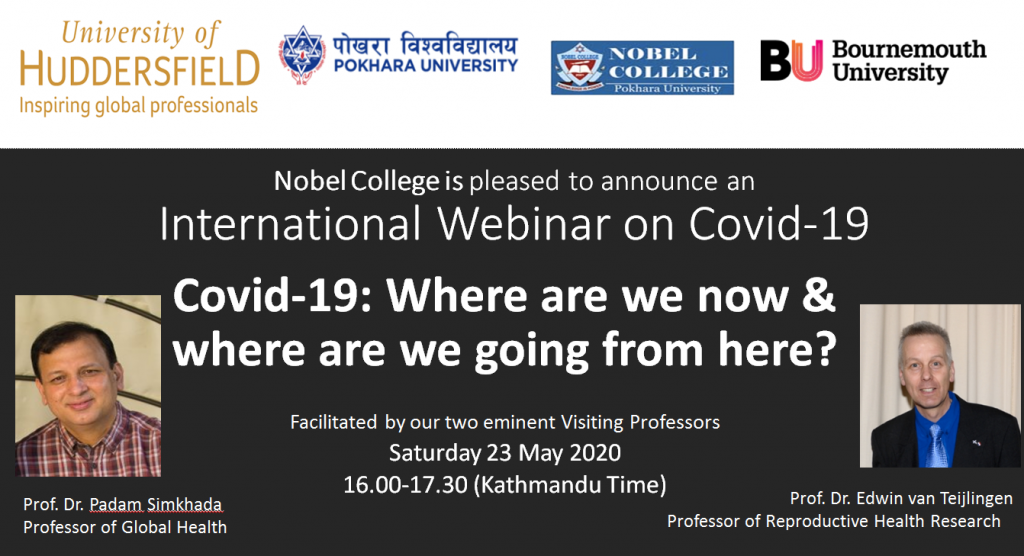
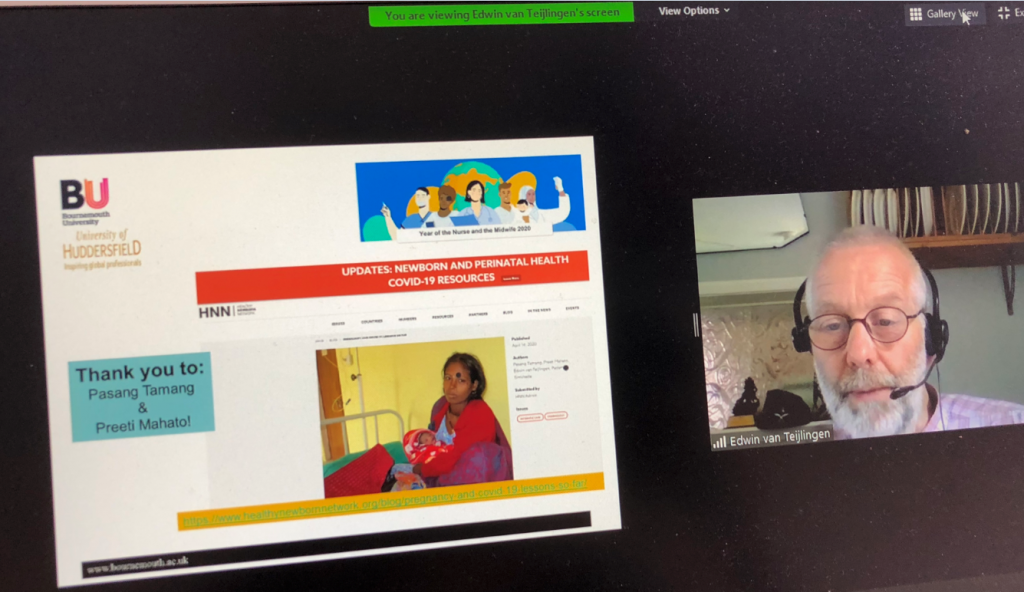

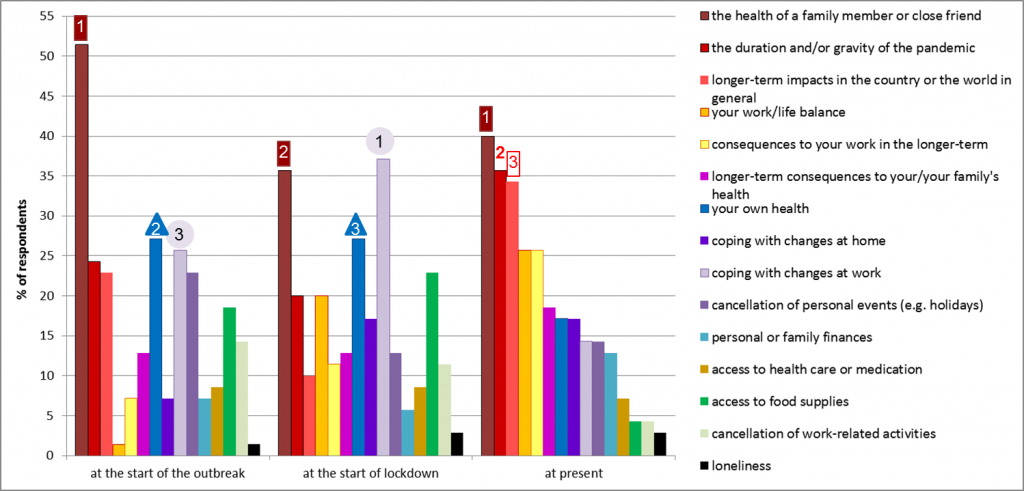

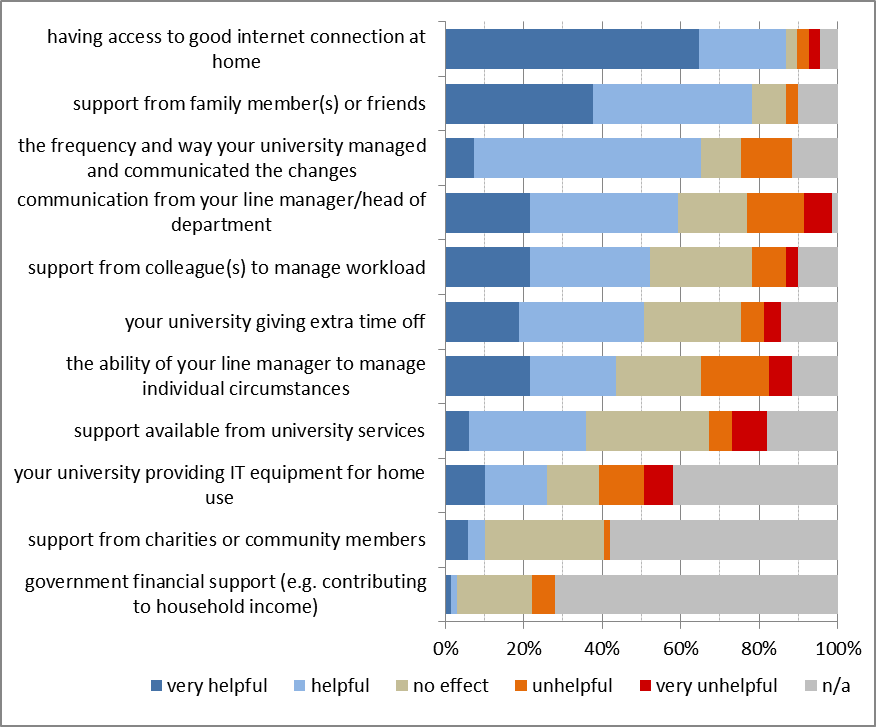

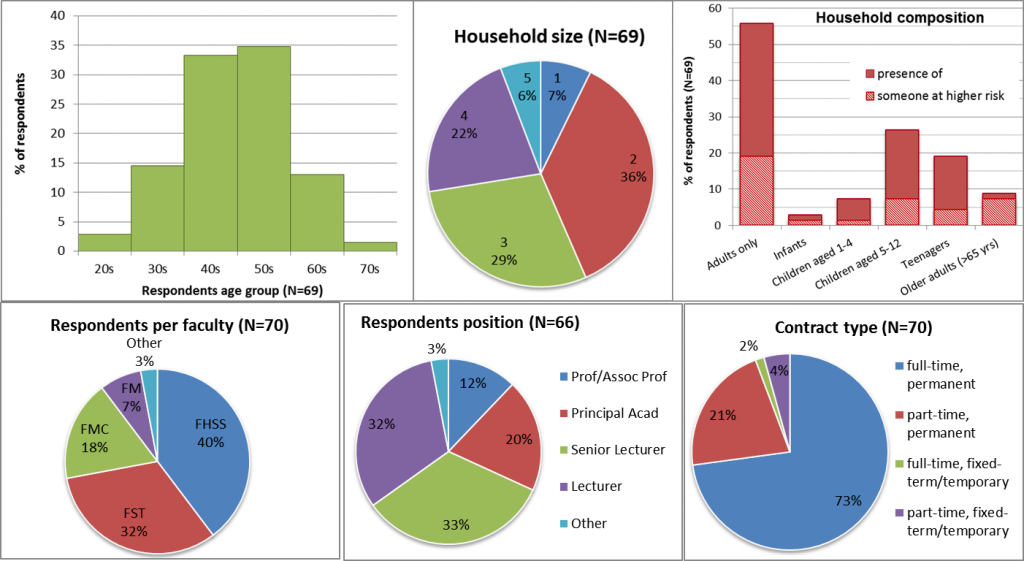
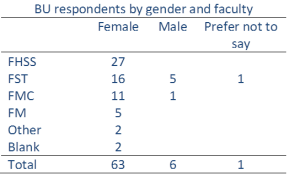

 In March, POST launched the Covid-19 outbreak expert database
In March, POST launched the Covid-19 outbreak expert database

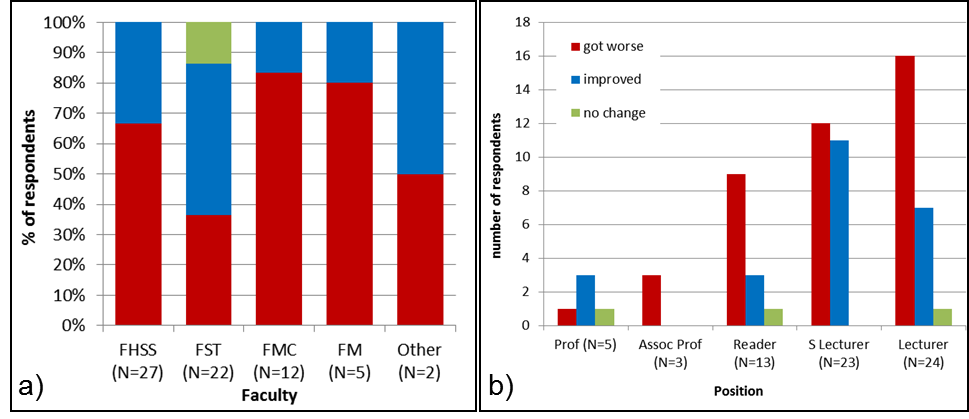



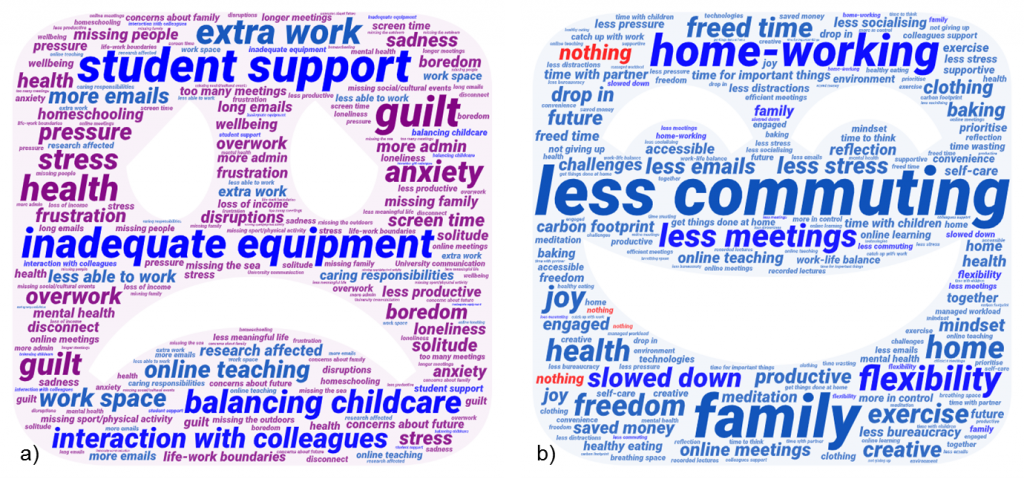

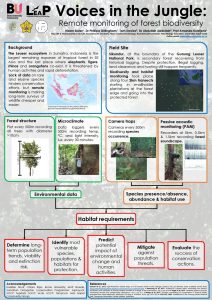
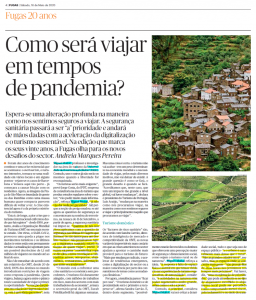
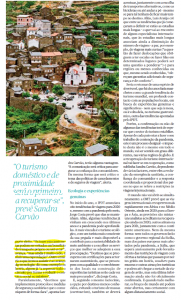
 Figure 1. Changes in work-life balance of respondents during Covid-19 lockdown (a) and the selected reasons for identifying positive or negative change (b). ‘Other’ refers to other reasons for improved or worsened work-life balance.
Figure 1. Changes in work-life balance of respondents during Covid-19 lockdown (a) and the selected reasons for identifying positive or negative change (b). ‘Other’ refers to other reasons for improved or worsened work-life balance. Figure 2. The level of impact of selected factors on the work-life balance of respondents during lockdown.
Figure 2. The level of impact of selected factors on the work-life balance of respondents during lockdown. Figure 3. Most cited top two aspects that have affected respondents’ work-life balance (a) positively and (b) negatively (showing categorised responses cited at least five times).
Figure 3. Most cited top two aspects that have affected respondents’ work-life balance (a) positively and (b) negatively (showing categorised responses cited at least five times).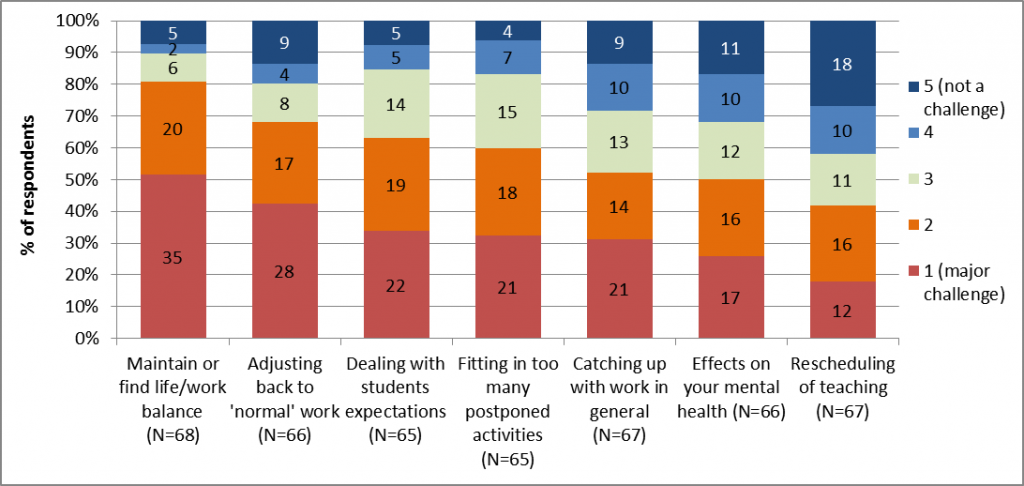 Figure 6. Major challenges identified regarding work at the end of lockdown.
Figure 6. Major challenges identified regarding work at the end of lockdown. Figure 7. Perception of long-lasting changes brought by the C-19 outbreak.
Figure 7. Perception of long-lasting changes brought by the C-19 outbreak.













 REF Code of Practice consultation is open!
REF Code of Practice consultation is open! BU Leads AI-Driven Work Package in EU Horizon SUSHEAS Project
BU Leads AI-Driven Work Package in EU Horizon SUSHEAS Project Evidence Synthesis Centre open at Kathmandu University
Evidence Synthesis Centre open at Kathmandu University Expand Your Impact: Collaboration and Networking Workshops for Researchers
Expand Your Impact: Collaboration and Networking Workshops for Researchers ECR Funding Open Call: Research Culture & Community Grant – Apply now
ECR Funding Open Call: Research Culture & Community Grant – Apply now ECR Funding Open Call: Research Culture & Community Grant – Application Deadline Friday 12 December
ECR Funding Open Call: Research Culture & Community Grant – Application Deadline Friday 12 December MSCA Postdoctoral Fellowships 2025 Call
MSCA Postdoctoral Fellowships 2025 Call ERC Advanced Grant 2025 Webinar
ERC Advanced Grant 2025 Webinar Update on UKRO services
Update on UKRO services European research project exploring use of ‘virtual twins’ to better manage metabolic associated fatty liver disease
European research project exploring use of ‘virtual twins’ to better manage metabolic associated fatty liver disease